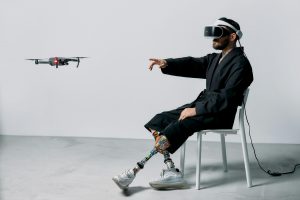The Role of Technology In Human Evolution

By Sibgha A
Throughout human development, natural selection of species, different pressures in the physical environment, and genetic mutation have served as drivers for evolution. Now, with a new determinant called technology, human development in modern times is influenced. From simple tools to sophisticated devices, technology renews the environment and begins to alter the very nature of our species. The question now is how technological growth will play a role in determining the course of human evolution.
Meanwhile, one of the most prominent developments would be the increased integration between technology and the human body: manifestations in new technologies such as bionic limbs, pacemakers, and cochlear implants to complement human functions where nature has failed. These are innovations constituting the first steps toward a future wherein technology and biology have combined with very few seams between them. As we are pushing the frontiers of biomedical engineering, ideas such as artificial organs or Brain Computer Interfaces (BCI) may dramatically change the notion of what it means to be human. With BCIs, for example, it might become possible for people to control machines or communicate through thought telepathically and extend natural cognitive capabilities.
Genetic engineering tools like clustered regularly interspaced short palindromic repeats (CRISPR) offer even more profound ways to shape human evolution. This technology enables the human genome to be edited with precision, allowing actual correction of genetic disorders or enhancement of traits like intelligence, strength, or longevity. For this reason, the idea of designer babies raises ethical questions. It will, however, be difficult to deny that genetic manipulation can accomplish things no other method has ever been able to offer – accelerating human evolution at a speed never thought possible. Whereas natural mutations could take several generations to occur and propagate, such specific genetic changes could be affected within one generation. Previously thought impossible feats may be re-imagined.
Another huge factor contributing to this is the rapid development of AI and automation. The progress in this respect is beginning to reshape the kind of work to be done and how humans must evolve. While most jobs that require lots of repetition or computation are increasingly ceded to machines, humans are, at the same time, being asked to become more creative, emotionally intelligent, and good at solving problems. As the traditional notion of labor shifts, so too are the very skills driving human survival and progress. But, in a world where machines can increasingly perform more tasks efficiently, humans will have to rethink their roles in life – to focus on abilities particular to humanity and that machines cannot replicate … at least not yet.
On a more systemic level, human technology’s impacts on the natural environment could also be a critical driver of evolution. The growth of cities, transportation systems, and digital connectivity is vastly changing how humans live and interact. The societies becoming interconnected translates back even into our social structures and, indeed, our mental frameworks. There is more urban living going on, with increased population density and change within the ecosystems. In due course, this sort of development will influence the traits of physical and psychological characteristics, as humans evolve to get along with stress, socialization, and environmental difficulties.
With this technological revolution comes some very important ethical queries, however. Should we “enhance” ourselves through genetic or technological means? And what of those who cannot afford access to such enhancements? There is also a fear that dependence upon technology may eventually render future generations less resilient to natural challenges as human biology becomes increasingly supplemented by artificial aids.
In the final analysis, technology is no longer a tool of man but represents an independent driving force in the development of human history. As much as developments occur in the fields of biomedical engineering, genetic modification, and artificial intelligence, so too will these technologies continue to dramatically reshape the course of human evolution. While these achievements forge a promising future, they also face us with the critical thinking needed in deciding on what kind of future we want, with ethical responsibilities there to be accorded. The interaction between nature and technology will frame the next frontier of human existence the boundaries set by evolution are redefined by human ingenuity.







